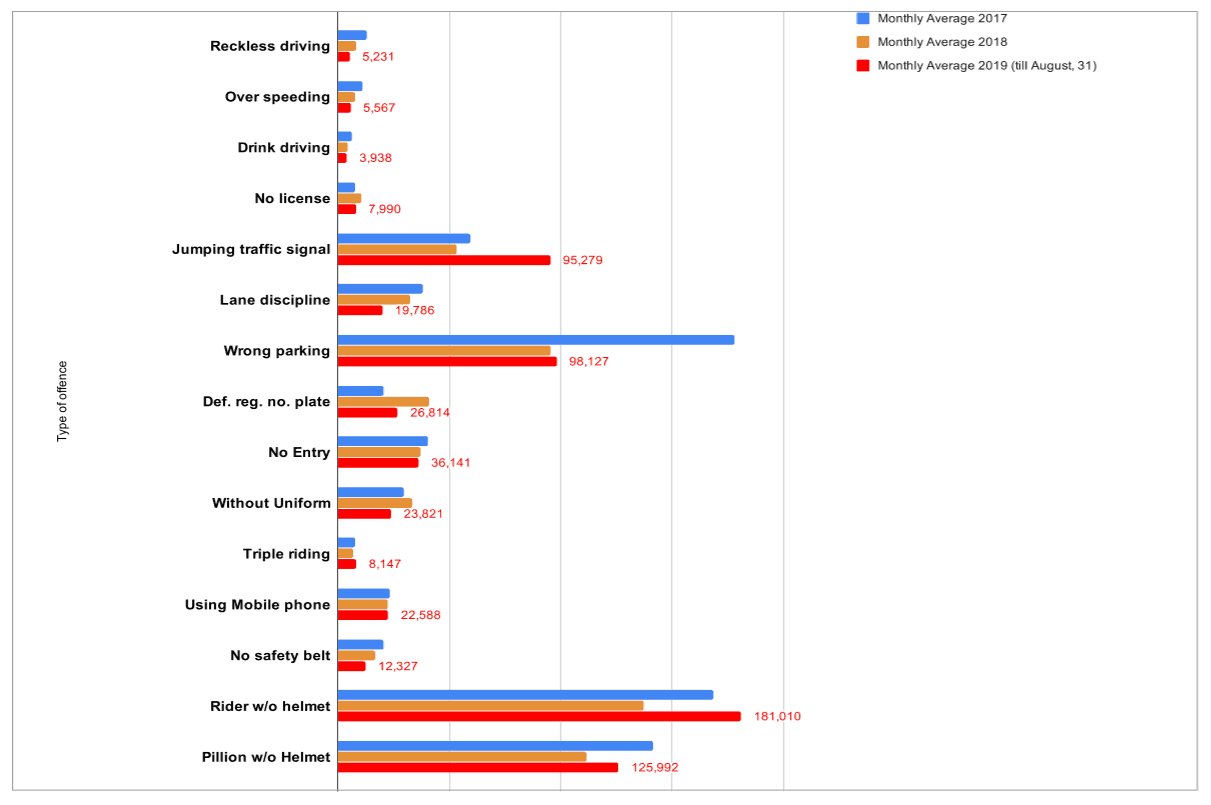As the revised fines for traffic offences has come into effect, the Bangalore Traffic Police (BTP) has geared up for strict enforcement. If the BTP follows its current pattern of booking offences, what kind of offences would it fine the most, and how much would the department make?
Previous years’ data shows that the highest number of cases are booked for just two categories – ‘rider without helmet’ and ‘pillion rider without helmet’ – out of 39 categories of violations overall.
This year, till August 31st, BTP booked over 14 lakh cases for driving without helmet, and another 10 lakh for riding pillion without helmet. Combined, these two categories made up over 41 percent of the cases booked in 2019. The trend was similar in 2018 and 2017 – together these two categories made up 36 percent and 37 percent of the total cases respectively in those years.
Following is the average number of traffic offences that were booked per month in 2017, 2018 and 2019 (till August 31st).

Monthly average of major traffic offences in 2017, 2018 and 2019 (till August 31st)
The graph above shows that despite the high number of cases booked, more drivers without helmets – but not pillion riders – have been booked this year compared to the previous two.
Wrong parking and signal-jumping also booked commonly
After helmet-less riding, the second highest number of cases are booked in the ‘wrong parking’ category. Between 2017 and 2019, the highest number of wrong parking cases were caught in 2017 – over 21 lakh. But since then, the number of wrong parking cases have reduced drastically. Similarly, cases booked for reckless driving, overspeeding and driving without safety belts have also reduced.
However, cases of ‘jumping traffic signal’ – the third most common offence booked – have increased between 2017 and 2019. This year, on average, over 95,000 riders were caught every month for jumping traffic signals. This is much higher than the number of signal-jumping offenders caught in previous years – over 53,000 per month in 2018, and over 59,000 in 2017.
Between ’17 and ’19, the number of cases booked for violating lane discipline and ‘No Entry’ signs have reduced. However, the number of people caught using their mobile phones while riding has almost remained the same – around 23,000 per month.
More cases against two-wheelers in 2019
Of the 59 lakh cases booked this year till August 31st, 67 percent were on two-wheelers, which is proportionate to the two-wheeler population in the city. According to the state Transport Department’s Annual Report for 2018-19, around 69 percent of the vehicles in Bengaluru are two-wheelers, 19 percent are cars and three percent are autorickshaws.
Of BTP’s cases this year, 14 percent were against Light Motor Vehicles (including cars), 17.8 percent were against tempos, goods vehicles and autorickshaws combined. Only 0.76 percent of the total cases booked were against buses. However, this may not imply that buses are let off for violations. The cases booked on buses came to 45,273, whereas the total buses in the city is 50,855, as per Transport Department’s data this July.
 Type of Vehicle fined in 2019 (Till Aug 31)
Type of Vehicle fined in 2019 (Till Aug 31)
Booked cases may not reflect actual violations
Anil Kumar P Grampurohit, Police Inspector (Traffic and Planning) at the Traffic Management Centre (TMC) in Ashok Nagar, says the data on booked cases may not give an accurate picture of the extent of various violations in the city. He says that cases booked for some offences are usually high, simply because those violations are easily visible.
But how do cases get booked? Apart from the usual checking, three DCPs conduct special drives in their respective zones to book violations that had been ignored that month, Grampurohit says. They also conduct special drives in certain areas, based on the most prominent complaint in that area. “We also receive complaints from apps like ‘I Change My City’, Publiceye app and the Public Eye Violation Post webpage of BTP. We verify these complaints, and book suspects under relevant sections of the Motor Vehicles Act,” says Grampurohit.
As per official data, 503 people were killed in road accidents this year till August 31st. The highest number of deaths occurred in KR Puram, Whitefield, Peenya, Hebbal, Yelahanka and Chikkajala.
BTP could make Rs 30 cr a month from helmet-less riders from now
From September 1st, the Motor Vehicles (Amendment) Act, 2019, came into effect. In the six days from September 4th to 9th, BTP collected around Rs 72 lakh from 6813 traffic violations, as per an official statement. Then too, the most number of cases were booked for helmet-less riding – over 67 percent. And 63 percent of the total fine amount came from these offenders alone.
The Act has increased the penalty for helmet-less riding from Rs 100 to Rs 1000. With this, the BTP could make Rs 30 cr per month just by booking drivers and pillion riders who don’t wear helmets.
On average, in 2019, the Bengaluru traffic police caught over three lakh riders (drivers and pillion riders combined) without helmets every month. So if the revised fine of Rs 1000 is levied from each of them, BTP could earn Rs 30 cr per month. However, the number of cases booked could be lower if the revised fines act as a deterrent, or if more offenders simply pay bribes to avoid the hefty fines!
I wish Telangana could copy the Karnataka model of implementing traffic regulations in Hyderabad. I miss Bengaluru a lot since I came to Hyderabad simply becoz of poor driving sense among the people here. I am also mulling leaving Hyderabad due to the same reason.